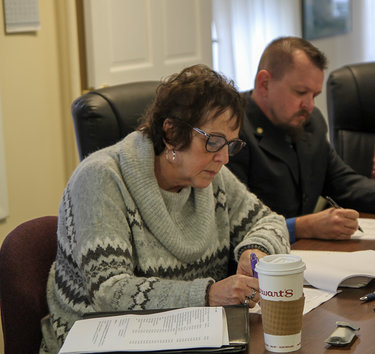Berne supervisor addresses town finances and accusations of hostility
BERNE — Berne Supervisor Dennis Palow told The Enterprise this week in a rare and wide-ranging interview that the allegations of hostility made against him by the three town board members who resigned in August are false, as are reports by The Enterprise that the town is in bad financial shape based on documents that it received through Freedom of Information Law requests.
While concerns about Palow’s behavior and the town’s finances under both his leadership and former Supervisor Sean Lyons before him are not new, they came into stark relief when board members Al Thiem, Leo Vane Jr., and Joe Martin — all of whom, like Palow, had been elected on Republican tickets — resigned abruptly and simultaneously this summer, saying that Palow withheld financial information from them and has been hostile when they’ve pushed for it.
Palow had not responded to various inquiries from The Enterprise about these matters, and has generally not been cooperative with requests from the newspaper, once declaring this intention publicly at a town board meeting.
This week, however, he suggested that he hopes to be more open with residents and the media as the town navigates its current governmental crisis.
“I’m just tired. It’s not worth it anymore,” Palow said of hostilities.
Board member allegations
When the three board members resigned in August, each of them cited the “hostile work environment” in their resignation letters, claiming in a follow-up interview with The Enterprise that Palow was both volatile and secretive.
These allegations were reminiscent of those made by Democrats on the town board prior to 2020, when that party still had majority control and had gone as far as to install metal detectors in the town hall and pay a sheriff’s deputy to keep watch over meetings based on what they considered to be Palow’s threatening behavior, particularly toward former board member Joel Willsey.
Willsey wound up being the only Democrat on the board from 2020 to 2022 when the GOP began sweeping elections in the Hilltowns, ultimately taking full control in Berne in 2023. Willsey said repeatedly that the Republican administration, then led by former Supervisor Sean Lyons, was denying him important information.
Willsey abstained from many votes over those two years as a result, and detailed his concerns repeatedly in letters to the Enterprise editor with supporting documentation.
The town of Berne is also being sued by former Supervisor Kevin Crosier, a Democrat, who was escorted out of a public hearing by sheriff’s deputies on Palow’s orders after Palow stopped Crosier from speaking, despite the fact that Crosier had not broken any of the meeting rules.
This week, Palow told The Enterprise that the three former board members who resigned in August have had full access to all the information that would normally be available to them, and sent The Enterprise copies of documents that show their signatures on abstracts and budget transfers. He also sent copies of emails from Senior Account Clerk Andrea Borst to all five of the five board members each month with various financial documents attached.
When The Enterprise asked about transfers it had seen from the town’s bank statements that were not on the lists of transfers authorized by the board members, Palow said again that “they get that every month” and that Borst only moves money around as authorized.
He did not acknowledge that there were transfers unaccounted for.
Martin, one of the former town board members, told The Enterprise earlier this year that he only became aware of those transfers when he looked at the bank statements directly.
He stood by the allegation when The Enterprise told him of Palow’s assertions this week.
“That stuff was never in our packets” distributed before the meetings, he said.
Martin, along with Vane, had also claimed after resigning that their attempts to dig into the town’s finances infuriated Palow to the point that he allegedly kicked them out of the town hall, becoming the final straw that led to their resignations.
Palow told The Enterprise this week that the incident stemmed from what he claims is a lack of legal understanding on their part, and that he had not kicked them out but refused to continue what was meant to be an informal meeting about town finances once three board members were present.
The New York State Open Meeting Law is technically ambiguous about whether a majority of a board’s members can meet in private if they’re not doing anything that would require a vote — e.g. going over finances for clarification — but the New York State Committee on Open Government has advised that any such meeting should be considered a public meeting, citing a landmark ruling by the state’s highest court, the Court of Appeals, in 1978 that drew a similar conclusion.
“Leo [Vane] showed up for a financial meeting that Joe [Martin], myself, and Andrea Borst were having to go over financial information that Joe wanted to discuss,” Palow said.
Palow said he initially was friendly with Vane but, when he told Vane he couldn’t join the meeting because of the quorum rule, Vane insisted that he join, saying that Palow couldn’t stop him from coming in and began cursing.
Palow said Vane eventually left on his own, “because he probably finally realized I was right,” and that issues with Martin arose during the meeting because Martin was “pointing fingers and blaming everybody for the position that we’re in.”
Palow said Martin eventually got “nasty” during the meeting and that, when he decided to stop the meeting, Martin began to leave but first accused Palow of having “problems.”
“I’m like, ‘Wow, OK,’ and he walked out on his own,” Palow said. “I never kicked anybody out of Town Hall. I don’t have the authority to kick people out of Town Hall.”
Martin again stood by his version of events this week, referring The Enterprise to an audio recording he had shared where Palow told Martin he wouldn’t show him a “f-cking thing” about the town’s finances.
Martin also said he was originally planning to meet with Borst alone and was surprised when Palow was there.
Vane said this week that he had shown up to the town hall before Martin, as both were expecting to meet together with Borst about the finances. However, he said he was in the other room when the other three began speaking about the finances and that Palow shooed him out of the room when he tried to enter.
“He was chiding me, saying ‘Bye-bye’ … almost like a child,” Vane said, after explaining that Palow said his own presence was a requirement for the meeting.
Vane also said that Palow told him to leave the town hall and that he ultimately decided to leave “so as not to escalate things or get wrapped up in his games.”
He summed up Palow’s version of accounts as “blatant lies.”
In general, Palow told The Enterprise that tensions in a work environment are natural, particularly when politics are involved.
“We’re all going to raise our voices at each other, we’re all going to curse at each other, I’m sure, and have our differences and different opinions, but that’s what politics is,” he said.
Town Clerk Kristin de Oliveira called The Enterprise at Palow’s request to discuss her feelings about the work environment under Palow, saying that she wouldn’t call it a “hostile or even toxic workplace.”
“I actually quite enjoy my job and coming to Town Hall,” she said. “I think for the most part we have a pretty good working relationship with all of the people here.”
De Oliveira also pointed out that the former board members were not in Town Hall frequently, only “time to time to review abstracts and stuff … so how much did they really experience our work environment?”
Finances
With regard to recent financial concerns — namely that the town’s payroll account has been overdrawn a number of times this year, money has been moved between accounts without clear authorization, and National Grid bills continue to go un- and underpaid — Palow addressed each with a variety of technical explanations, leaning on De Oliveira to get into specifics.
On the transfers, specifically in and out of payroll, Palow said that expenses in that fund are fluid since staffing needs can change on the fly.
Using the example of Highway Superintendent Randy Bashwinger’s highway crew, Palow said if Bashwinger “had four working but he only thought three were going to be working and he went a little bit over, we would just pay that payroll from a different fund, but then get it back.”
“From my understanding,” he said, “it’s like loaning money and then giving it back when you get the money.”
On the overdrafts, de Oliveira told The Enterprise that “maybe a transfer wasn’t made or it wasn’t made in time, maybe it was made at the end of the business day.”
Ultimately, she said, all the overdraft fees were refunded by the Bank of Greene County.
“We have the funds, the money just hadn’t been moved from wherever it needed to come from for whatever reason,” she said.
De Oliveira said the town has been having “issues” with its National Grid bills “ever since I got into office” in 2022.
All the accounts for the different properties in the town, she said, are on different billing cycles, and that, before the town moved to an online payment system, the mail cycle would cause backups.
“If we mail a check, by the time they receive it and process it and add it, they’ve already made the next statement,” she said. “It may show that we haven’t paid it, but we know, because of our accounting software, we’re just waiting for that check to clear.”
There were a few occasions when checks would be sent back because the company allegedly changed its Post Office box, she said, causing further delays.
There also seems to be a delay in place even with the online payments, she added.
“There must be another step where someone still has to physically apply it,” she said.
There’s “kind of a lot of different factors in there on that one,” she said of the late and missing payments displayed on the bills, but she also said that the town has “cleaned it up quite a bit from what it was.”
Governor’s inaction
In the midst of all this, the Berne Town Board is still paralyzed by its lack of quorum and the governor’s inaction so far on making an appointment, as she did for a town in a similar situation earlier this year.
New York State Town Law says the governor may either call a special election or make an appointment in such a situation.
Palow told The Enterprise that his contact in the governor’s office, Capital Region Representative Dan Wrenn, had initially promised that Palow could name his preferred appointment, but, when he submitted the name of former town clerk and board member Anita Clayton, the governor’s office did not follow through and hasn’t explained why or what it’s plans are.
Clayton, who is enrolled as a Democrat, was elected to the town board in 2022 on the Republican ticket and Palow named her as his deputy supervisor. Although she came on as town clerk under Crosier, she was largely viewed by the local Democratic Party as being complicit in the various things the Republicans were being accused of once they took power.
Palow said that, while he wonders what the governor is up to, he doesn’t blame her for the town’s crisis.
“It’s the three former board members who all resigned for no reason,” he said.
A United States Army veteran, Palow brought up the oath he took when he joined the military as well as that for town board when he accused the former board members of going back on their oaths.
“I went through two-and-a-half years where we were outnumbered [on the town board],” Palow said of himself and former Supervisor Lyons.
“I didn’t resign and Sean Lyons didn’t resign because we took an oath and we promised these people that we would represent them,” he said.


